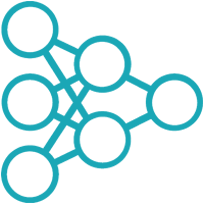Happy Hour
Discussion Group Tables
Food & Drink Provided
5:00 PM | 1 Hour | June 13th
Apply To Join
Table 1
Discussion Theme:
Generative AI in Products
Guided Discussion Topics:
- How to prototype new ideas – what works/doesn’t
- What technology stack used/being considered?
- Approaching research vs application
Table 2
Discussion Theme:
AI Alignment
Guided Discussion Topics:
- How are you thinking about AI Alignment?
- Evaluating importance, benefits, and risks of neglecting AI alignment.
- Ethical implications
Table 3
Discussion Theme:
Feature Stores
Guided Discussion Topics:
- Perceived benefits & advantages
- Design considerations and best practices?
- How you integrate with ML Workflows & tooling?
- Collaboration and governance in feature stores – your approach?
Table 4
Discussion Theme:
Model Observability
Guided Discussion Topics:
- Your current techniques and approaches for monitoring the performance and behavior
- How you Interprete model decisions and understanding behavior?
- Do you capture and manage model metadata?
Table 5
Discussion Theme:
AI Scalability
Guided Discussion Topics:
- Model deployment challenges across multiple locations/applications.
- Data management for AI scalability (e.g., variance elimination, data augmentation, balancing).
- Performance monitoring and improvement suggestions over time.
- Automated model retraining and performance evaluation
Table 6
Discussion Theme:
Cloud Migration Strategies for Large-Scale Enterprises
Guided Discussion Topics:
- Critical considerations when planning a cloud migration strategy for a large-scale enterprise
- Best practices for optimizing cost efficiency and resource utilization in the cloud
- How can we ensure alignment with business goals and objectives throughout the migration journey?
Table 7
Discussion Theme:
Overcoming Organizational Silos
Guided Discussion Topics:
- How can we encourage knowledge sharing and collaboration among different departments to break down silos and promote a holistic approach to AI initiatives?
- Examples of cross-functional teams working together effectively in implementing AI projects, and what can we learn from them?
Table 8
Discussion Theme:
Data Talent Planning in your Digital Transformation
Guided Discussion Topics:
- How to beat your competition in hiring top bucket data talent (entry level & experienced hires)
- Talent and employment trends across Canada
- The next generation of data talent. What are they seeking?
- How are you levelling data literacy across your organization?
Table 9
Discussion Theme:
Health & Machine Learning
Guided Discussion Topics:
- Accessing health data – how to overcome barriers?
- NLP use cases in healthcare large graph-network of patients
- Synthetic health data
- Real word evidence and machine learning to optimize treatments
Table 10
Discussion Theme:
Designing LLM Applications
Guided Discussion Topics:
- Dealing with factuality/hallucinations
- Dealing with inference latency challenges
- Dealing with unpredictable failure modes
- Choosing between Open Source models vs Paid APIs
- The Build vs Buy dilemma
Table 11
Discussion Theme:
AI Governance: Ensuring Ethical and Responsible AI Deployment
Guided Discussion Topics:
- What are the key challenges in implementing responsible AI practices in real-world deployments?
- What are the key challenges for robust AI governance frameworks to ensure ethical and responsible AI deployment?
- What role does interpretability and explainability play in your AI governance?
- How are you working towards accountability, transparency, and auditability in AI systems?
Table 12
Discussion Theme:
Insights to Actions - Measuring Production ML
Guided Discussion Topics:
- What are the key challenges in conducting effective root cause analysis for issues encountered in machine learning models or AI systems?
- How can data scientists and practitioners leverage insights from root cause analysis to drive actionable improvements in model performance and system behavior?
- What are some practical techniques and tools for identifying and investigating the root causes of issues in machine learning models?
- How can organizations establish processes to bridge the gap between identifying root causes and implementing effective corrective actions?
- What role does collaboration and knowledge sharing play in conducting successful root cause analysis and driving continuous improvement?
Table 13
Discussion Theme:
Women + Data/ML/AI
Guided Discussion Topics:
- How can women in Data/AI/ML build communities that better supports each other
- What can workplace and male allies do to support the needs of women and promote work life balance/integration
- What are some of the emerging opportunities and trends in AI/ML that can be leveraged to promote gender equality
- What are the ways for women to establish effective mentorship and sponsorship networks?
Table 14
Discussion Theme:
Data Strategy
Guided Discussion Topics:
- What are the key objectives and core activities of data strategy?
- How can a company assess its current data maturity level and devise its data strategy accordingly?
- How is Data Strategy different from Data Governance?
- With an emerging complexity of organization’s data landscape, how do you monitor the health of data pipelines and data infrastructure?
Table 15
Discussion Theme:
How VCs can Help your Venture in AI
Guided Discussion Topics:
- What should be the fundraising strategy for AI startups?
- What kind of support that an VC can provide to AI founders?
- Given the popularity of AI this year, should I start a company to capture the tailwind?
- How should I select the best investor to help me build my company?
- Should I talk more to US VCs or Canadian VCs when I first start?
Table 16
Discussion Theme:
LLMOps - What's Needed to Take your LLM into Production
Guided Discussion Topics:
- How do you run your LLM tools at scale?
- Is OpenAI good enough for your business?
- Are you fine with tying yourself to their APIs?
- Who manages the LLM infrastructure, how can you be sure it will continue working?
- On-prem / hosted.
FAQ
The Carlu, downtown Toronto, Canada (Same location at the TMLS conference)
It’s simple, rather than awkwardly standing around or having to approach a complete stranger to network, this year during the Happy Hour we’ve set up Round Table discussions with food and drink. Each table will have a subject. We’ll start with light intro’s and then dive into 4-5 lightly moderated discussion points based on that theme. Everyone will be encouraged to share within their own comfort level.
If you’d like to propose a theme to be held at a table you can do so! If you see a topic you’d like to join, you can also do that.
Tables will be 8 people max. To be clear- this won’t be on stage, recorded or held in front of an audience. The goal is to help you meet and share with other peers, and as well, engage in thoughtful discussions and new ideas in a welcoming environment.
When you arrive at your table there will be a sheet with the Theme + talking points for all participants. The intention isn’t to be militant with the structure of the conversation, we will have a moderator (for all tables) who will announce some light reminders when it’s time to move onto next discussion prompts.
No. The sign-up form will indicate if there’s a preference for experience level or other qualifiers for a given table
No, but we hope you’ll be there to participate! If approved, we’ll use your prompts to guide the discussion via our head moderator.
Please refer to our General Code of Conduct for the Conference, as per the Eventbrite registration.
For the round-table discussions we’ve designed this, not only to provide a safe and respectful environment, but to maximize learning, networking and takeaways for participants to speak freely, openly with peer-to-peer learning in the most effective way.
Respectful Dialogue: We use respectful and inclusive dialogue, allowing everyone to express their ideas and experiences without interruption, criticism or unsolicited advice. We try not to give advice unless asked for, but to share stories, as they are the best method to impart wisdom; your experiences are memorable and resonate best. Don’t hog the proverbial mic, be concise and land the plane. We focus on ideas and don’t engage in personal attacks.
Active Listening: Engage in active listening, give full attention to the speaker and refrain from side conversations or phone.
Balanced Participation: Strive for equal participation among all attendees to ensure diverse perspectives are heard. We discourage any dominating behaviours and remind participants to give everyone an opportunity to contribute.
Confidentiality: We maintain confidentiality and always respect the privacy of fellow participants. Operate under the assumption that all matters discussed are strictly private and confidential unless explicitly indicated otherwise.
Time Management: We’re mindful of time constraints. Be concise in your contributions, allowing for a smooth flow of the discussion and accommodating everyone’s input.
Open-Mindedness: Approach the discussion with an open mind and be willing to consider different viewpoints.
Technology Usage: Silence mobile phones and minimizing distractions caused by checking emails or social media. Recording the conversation is prohibited.
Moderator Role: We won’t have a specific moderator per table, rather a stage moderator for all tables that will give time reminders (as per the printed sheet and guided questions) to encourage the continual progression of the discussion & listed questions. Participants are expected to self-facilitate the discussion, maintain order, and ensure adherence to the communication policy. Let the sheet, and head moderator be your guide!




